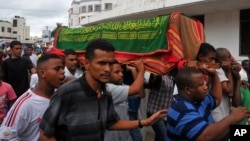NAIROBI —
Kenya's government defended the efforts of its security services on Monday despite deadly weekend bombings, seven months after the Westgate shopping mall attack, and said it has foiled many other plots.
Blasts in Nairobi and Mombasa killed seven people this weekend, but for months many Kenyans have voiced growing anger that militants - believed to be linked to Somalia's al-Qaida-aligned al-Shabab group or their sympathizers - have continued to stage sporadic attacks with apparent ease.
"We have disrupted a lot of schemes of the terrorists in our country," Deputy President William Ruto told journalists in response to questions about public frustration over insecurity.
"The many that we manage to disrupt sometimes are lost when one happens in the country, because that is what people notice."
There were no immediate claims of responsibility for the weekend attacks, but Somalia's al-Shabab said it carried out the Westgate raid in Nairobi in September in which gunmen killed at least 67 people.
Al-Shabab has said that that attack and others it has claimed in Kenya were to demand Kenyan troops withdraw from neighboring Somalia.
Ruto repeated that his government would not to pull its soldiers out of Somalia, saying that would let al-Shabab regroup and create a bigger threat to Kenya.
"We will not relent and we will not withdraw from Somalia," Ruto said, noting that Kenya would not succumb to "blackmail".
"We are on top of this situation," he said of the security response. "What you see are desperate kicks of a dying horse."
Security worries are hurting Kenya's tourism industry.
Hotels on the popular coast north and south of Mombasa have seen a drop in bookings since Westgate and because of other attacks.
The U.S. Embassy in Nairobi told its citizens after Saturday's attacks on Mombasa to avoid any travel to the port city "for the time being".
Western diplomats have privately said Kenyan security forces - which receive aid and training from the United States, Britain and Israel among others - could do more to secure the nation and said rivalries between agencies hampered intelligence work.
In his comments at the news conference, Ruto said different arms of the security services were operating together: "All our security agencies have been working coherently and indivisibly."
In the aftermath of Westgate, many Kenyans complained there were no high-level resignations despite failings in handling the four-day siege, including looting of the mall by soldiers.
Responding to a question about whether top officials would take responsibility after the weekend attacks, Ruto said: "We don't want to participate in a game of musical chairs."
He called on all citizens to stay vigilant and help spot suspicious individuals or packages. He said steps would be taken to protect travellers on public transport and urged the judiciary to act, after saying some suspected militants were released on bail and then carried out or plotted attacks.
Blasts in Nairobi and Mombasa killed seven people this weekend, but for months many Kenyans have voiced growing anger that militants - believed to be linked to Somalia's al-Qaida-aligned al-Shabab group or their sympathizers - have continued to stage sporadic attacks with apparent ease.
"We have disrupted a lot of schemes of the terrorists in our country," Deputy President William Ruto told journalists in response to questions about public frustration over insecurity.
"The many that we manage to disrupt sometimes are lost when one happens in the country, because that is what people notice."
There were no immediate claims of responsibility for the weekend attacks, but Somalia's al-Shabab said it carried out the Westgate raid in Nairobi in September in which gunmen killed at least 67 people.
Al-Shabab has said that that attack and others it has claimed in Kenya were to demand Kenyan troops withdraw from neighboring Somalia.
Ruto repeated that his government would not to pull its soldiers out of Somalia, saying that would let al-Shabab regroup and create a bigger threat to Kenya.
"We will not relent and we will not withdraw from Somalia," Ruto said, noting that Kenya would not succumb to "blackmail".
"We are on top of this situation," he said of the security response. "What you see are desperate kicks of a dying horse."
Security worries are hurting Kenya's tourism industry.
Hotels on the popular coast north and south of Mombasa have seen a drop in bookings since Westgate and because of other attacks.
The U.S. Embassy in Nairobi told its citizens after Saturday's attacks on Mombasa to avoid any travel to the port city "for the time being".
Western diplomats have privately said Kenyan security forces - which receive aid and training from the United States, Britain and Israel among others - could do more to secure the nation and said rivalries between agencies hampered intelligence work.
In his comments at the news conference, Ruto said different arms of the security services were operating together: "All our security agencies have been working coherently and indivisibly."
In the aftermath of Westgate, many Kenyans complained there were no high-level resignations despite failings in handling the four-day siege, including looting of the mall by soldiers.
Responding to a question about whether top officials would take responsibility after the weekend attacks, Ruto said: "We don't want to participate in a game of musical chairs."
He called on all citizens to stay vigilant and help spot suspicious individuals or packages. He said steps would be taken to protect travellers on public transport and urged the judiciary to act, after saying some suspected militants were released on bail and then carried out or plotted attacks.





